Dr. Murray Evans Retires
Thu. Oct. 6, 2016
 Department of English faculty member, Dr. Murray Evans, retired earlier this year after more than three decades at the University of Winnipeg. During his distinguished career, Murray served as Department Chair and Acting Associate Dean of Arts and Science, published two books and dozens of articles, and taught hundreds of students. He was an ever-cheerful presence on Ashdown Hall’s second floor and will be greatly missed. We’ve asked him a few questions about his career and future plans.
Department of English faculty member, Dr. Murray Evans, retired earlier this year after more than three decades at the University of Winnipeg. During his distinguished career, Murray served as Department Chair and Acting Associate Dean of Arts and Science, published two books and dozens of articles, and taught hundreds of students. He was an ever-cheerful presence on Ashdown Hall’s second floor and will be greatly missed. We’ve asked him a few questions about his career and future plans.
What inspired you to see academia as the career you wanted to pursue?
I was inspired by both failure and success in graduate school. Failing a Ph.D. comprehensive exam (twice!) before passing it forced me to learn better to make persuasive arguments out of masses of detail and the experience equipped me to help future students discover more successful writing strategies. As for success, in my last year of grad study, I had an article published in a major journal (rare then for grad students), a Canada Council Doctoral Fellowship, and a 12-month appointment at University of Manitoba. Inspiring: I had come back from near academic death and knew I would be eating for one more year.
When and why did you come to UW?
After four years of temporary appointments, in 1982 I was appointed tenure-track at UW. Winnipeg attracted me because I had friends in the city. UW English Department needed a specialist in 13th-15th-century literature as well as someone to teach Shakespeare, composition, and children’s literature. It was a good fit.
What are the highlight(s) of your research?
One highlight in my research was work in two then emerging areas: codicology (the study of manuscripts as wholes, not just for their individual written texts) and quantitative analysis. The result was my book Rereading Middle English Romance (1995) that combined visual analysis and computer-assisted statistical analysis of manuscript features, with more conventional literary/historical analysis. A second research highlight was the opportunity to use the “new” literary and then cultural theory, arising as I started teaching, throughout my research career. Finally, branching out into Coleridge studies was for me both surprising and rewarding, resulting in my book Sublime Coleridge (2012).
What were the highlights of your time working in the English Department?
A highlight throughout my time was working with my English colleagues, who took care to work constructively with one another, a huge positive. Other highlights relate to my administrative work: serving as Acting Associate Dean of Arts and Science (Students); chairing the committee that in 1986 wrote and saw through Senate the founding document of the Writing Program (now Department of Rhetoric, Writing, and Communications); and, while I was Department Chair, overseeing the successful passing of the MA in Cultural Studies document through Senate, thanks to the hard curricular work of several English colleagues. Finally I need to mention my students over the years, whose trust and hard work and wonderful variety I will never forget.
What reflections do you have on changes at UW during your time here?
My time here saw the advent of personal computers and other digital technologies, on balance greatly assisting our efficiencies and sometimes creativity. This period also saw pressures on faculty, as self-governors of universities, to become “employees” of their universities. I hope that faculty, for the good of our collective UW mission, will continue to avoid passive complaining about university affairs and instead, continue to “use their tenure” in proactive self-governance—including helping to remedy the systematic use of underpaid, temporary teaching staff.
What are your future plans?
I am a member of a book club, a drinking club, and two research groups: the Friends of Coleridge and UW’s CLASS (Centre for the Liberal Arts and Secular Society). I continue to work on my second book on Coleridge, on his later prose in relation to recent sublime theory. More piano practice and performing is also on my list. Meanwhile, I like doing nothing and intend to get better at it, leaving room for new ventures to arise as they may.
Thank you, Murray. We wish you all the best in your retirement.
Photo credit: Bruno Cornellier (taken at Murray’s Department retirement party in May)
